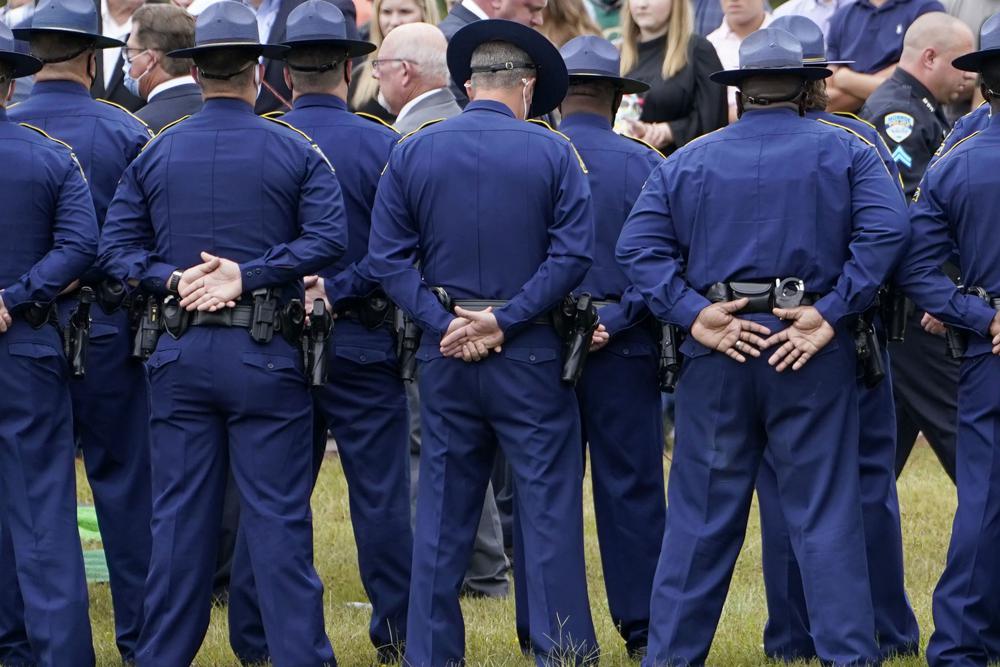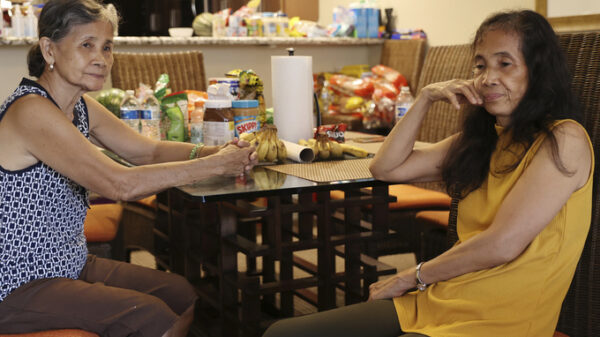FILE – In this Friday, Sept. 25, 2020 file photo, troopers gather during the burial services for Louisiana State Police Master Trooper Chris Hollingsworth in West Monroe, La. Hollingsworth died in a single-car crash hours after he learned he had been fired for his role in the in-custody death of Ronald Greene. As the Louisiana State Police reel from a sprawling federal investigation into the deadly 2019 arrest of Greene, a Black motorist, and other beating cases, dozens of current and former troopers tell The Associated Press of an entrenched culture at the agency of impunity, nepotism and in some cases outright racism. (AP Photo/Rogelio V. Solis)
MONROE, La. (AP) — Growing up in the piney backwoods of northern Louisiana, where yards were dotted with crosses and the occasional Confederate flag, Jacob Brown was raised on hunting, fishing and dreams of becoming a state trooper.
But within weeks of arriving at the Louisiana State Police training academy in Baton Rouge, instructors pegged Brown as trouble. One wrote that he was an arrogant, chronic rule breaker with “toxic” character traits that should disqualify him from ever joining the state’s elite law enforcement agency.
Fortunately for Brown, the state police was known as a place where who you knew often trumped what you did, and where most introductory chats eventually got around to a simple question: Who’s your daddy?
Jacob Brown is the son of Bob Brown, then part of the state police’s top brass who would rise to second in command despite being reprimanded years earlier for calling Black colleagues the n-word and hanging a Confederate flag in his office. And the son would not only become a “legacy hire” but prove his instructors prophetic by becoming one of the most violent troopers in the state, reserving most of his punches, flashlight strikes and kicks for the Black drivers he pulled over along the soybean and cotton fields near where he grew up.
When friends and colleagues would ask Bob Brown how his first-born was getting along as a trooper, he’d respond with a seemingly innocuous boast:
“He’s knocking heads.”

The Browns’ story is woven throughout the recent history of the Louisiana State Police and represents what dozens of current and former troopers have described to The Associated Press as a culture of impunity, nepotism and in some cases outright racism.
It illustrates the dynamics that have made the agency the focus of a sprawling federal investigation that initially examined the deadly 2019 arrest of Black motorist Ronald Greene and has since expanded to include a string of other cases — several involving Jacob Brown — in which troopers are accused of beatings and cover-ups, even when they are caught on video.
“If you’re a part of the good ol’ boy system, there’s no wrong you can do,” said Carl Cavalier, a Black state trooper who was once decorated for valor but recently fired in part for criticizing the agency’s handling of brutality cases.
It’s an us-versus-them culture, they say, in which many troopers and higher-ups are more interested in covering for each other than living up to the agency’s image of honor, duty, courage and “doing the right thing.”
It’s a culture in which troopers who gather for backyard barbecues and church on Sundays feel so insulated from scrutiny that they can banter about their brutality on official channels, including texting each other photos of a battered and bloodied suspect with the quip “he shouldn’t have resisted.”
It’s a culture in which 67% of troopers’ uses of force in recent years targeted Black people — double the percentage of the state’s Black population – and in which troopers kept their badges after sending overtly racist emails with such headings as “Proud to be White.”
And it’s a culture in which state police academy instructors faced with a widespread cheating scandal sought to dismiss an entire recent class of cadets — including the “legacies” of several high-ranking police officials — yet nearly all were allowed to graduate to jobs on the force.
“There’s a corruption that allows the reprobates in state police to just sort of do as they damn well please,” said W. Lloyd Grafton, a use-of-force expert who is consulting on the Greene family’s civil case and served on the Louisiana State Police Commission. “Nobody holds them accountable.”
‘WE’VE GOT TO FACE THIS HEAD ON’
A potential reckoning in the Louisiana State Police came in the wake of Greene’s death on a rural roadside near Monroe on May 10, 2019 — a fatality troopers initially blamed on a car crash at the end of a high-speed chase.
State police later acknowledged Greene was involved in a “struggle” with troopers but officials from Gov. John Bel Edwards on down refused for more than two years to publicly release the body camera video. When it was eventually published by the AP this spring, the footage showed white troopers swarming Greene’s car, stunning, punching and dragging him by his ankle shackles, even as he appeared to surrender, wailing, “I’m your brother! I’m scared, I’m scared!”

Fallout brought federal scrutiny not just to the troopers but to whether top brass obstructed justice to protect them, according to documents and people familiar with the case. Investigators have focused on a meeting that the elder Brown attended in which state police commanders pressured their own detectives to hold off on arresting a trooper seen on body-camera video striking Greene in the head and later boasting, “I beat the ever-living f— out of him.”
Greene’s death was among at least a dozen cases in the last decade identified by the AP in which state troopers or their bosses ignored or concealed evidence of beatings, deflected blame and impeded efforts to root out misconduct.
Many of those cases involve the state police’s Monroe-based Troop F, which has become notorious for its treatment of Black motorists and counted Jacob Brown among its troopers. In one long-suppressed video, he can be seen pummeling a Black motorist with a flashlight, in another he slams a Black motorist into a police cruiser, and in yet another Brown and other troopers beat a Black man and hoist him to his feet by his dreadlocks. That was followed by troopers exchanging “lol”-peppered text messages bragging that the “whoopin” would give the man “nightmares for a long time.”
Copyright 2021 Associated Press. All rights reserved.






























You must be logged in to post a comment Login